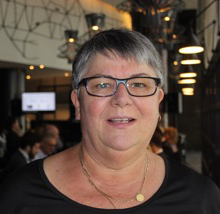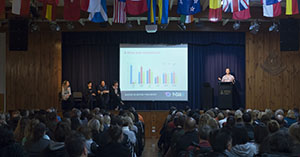Dr Siobhan Bourke answers a few of your questions.
Q. WHY IS IT IMPORTANT TO USE CORRECT SEX AND HUMAN BODY TERMINOLOGY FROM DAY ONE?
“As soon as we use a euphemism, we’re creating a taboo. We’re saying to kids, it’s not right to use the right language. They pick up on that – we won’t talk about it, we’ll hide it. And from not calling your penis your penis and not calling your vagina your vagina, it leads to other things that they’re not supposed to talk about.
And the whole subject of sex becomes taboo. When that occurs, we end up with kids not talking about some of the most important things in their life.”
Q. SO HOW DO PARENTS APPROACH THOSE CONVERSATIONS?
“It’s not the conversation you have at the top of your voice in the middle of the supermarket, and there are appropriate levels of information. The key is to have little conversations and have them often. You don’t have to give them a full-on manual, but you can discuss simply what goes on with sex and methods of protection against infection and pregnancy.
When girls are heading towards puberty and having their periods it is a great opportunity to have this conversation. For some girls they may know that mum or others are bleeding – they notice things in bathrooms or walk in on mum in the toilet, so the conversations may start even earlier than puberty. You can explain the function of periods and the menstrual cycle as your body preparing for pregnancy, and then, if not getting pregnant, a period comes; details will depend on the age of the girl.”
Q. IS IT IMPORTANT FOR PARENTS TO REALISE THEY DON’T HAVE TO KNOW THE ANSWERS TO EVERY QUESTION?
“Parents think they are supposed to know all about sex, but you don’t have to know everything. It’s about working stuff out together, like you would other topics. The most protective factor for kids for sex and drugs is that connectedness in families.
If your child can ring you at 3am and say ‘come and help me’, you’ve maintained that connection. If they can say to you, ‘I like so and so and want to talk to you about sex’ or ‘where do babies come from’ and get an honest answer, that is the safest thing for kids going out into the world.
Sometimes conversations are awkward for both parents and children but they need to be had.
If maintaining eye contact is making either party feel nervous, try having the conversation you have in the car or while doing the dishes. As the adults and guardians, we need to have these conversations.“
Q. WHAT DO PARENTS NEED TO KNOW ABOUT PORNOGRAPHY?
“Pornography is so much more accessible today. Porn also seems to be increasingly violent in nature, particularly against women. But it’s also damaging for young people, especially men, because it takes away their understanding of what loving, caring and responsible relationships are.
We need to be able to talk to our young people about pornography in conversations around their sexuality.
That’s why it’s important to develop that ability for your young person to be able to talk to you about whatever.”
Q. WHAT ARE THE MOST COMMON SEXUALLY TRANSMITTED INFECTIONS AFFECTING YOUNG PEOPLE?
“Chlamydia is the most common bacterial infection – spread by unprotected sexual activity. It’s simple to detect, with a urine test, and it’s easily treated with antibiotics. The most commonly transmitted STI is the human papillomavirus or HPV. More than 80 per cent of people get it and it’s very difficult to avoid but most people clear it without even knowing they had it.
There are some types of HPV virus that cause changes to the cervix and can lead to cervical cancer down the track, but we now have a vaccine to prevent that.
The Australian government put this vaccine on the National Immunisations program for girls aged 12 or 13 (equivalent to year 7 at high school) in 2007 and then included boys aged 12 or 13 in 2013. This is showing to be a great protection against cervical cancer and other HPV-related cancers.
There are other STIs around so simple advice is to use protection (condoms) and to get regular checks – sexually active people under 30 are recommended to have a urine chlamydia test once a year.”
Q. WHAT ADVICE DO YOU HAVE WHEN PARENTS DISCUSS CONTRACEPTION WITH THEIR KIDS?
“The first thing most people talk about is the pill but for young women, long-acting reversible contraceptions (LARC) that you don’t have to remember and think about every day are more reliable and convenient. There are intrauterine devices and the Implanon implant, which are both available for young women – even those who have not been pregnant or given birth.
It is also good to remember when there has been a contraception failure the morning-after pill, or more appropriately called emergency contraception,
can be taken up to 120 hours after unprotected sex, although it’s most effective within the first three days.”



